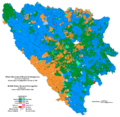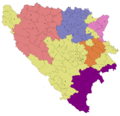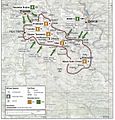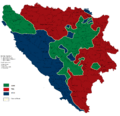Bosnian War facts for kids
Quick facts for kids Bosnian War |
||||||||
|---|---|---|---|---|---|---|---|---|
| Part of the Yugoslav Wars | ||||||||
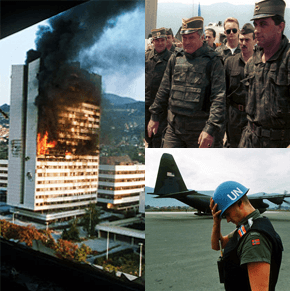 The Executive Council Building burns after being hit by tank fire in Sarajevo May 1992; Ratko Mladić with Army of Republika Srpska officers; a Norwegian UN soldier in Sarajevo. |
||||||||
|
||||||||
| Belligerents | ||||||||
|
1992: |
1992: |
|||||||
|
1992–94: |
1992–94: |
1992–94: Supported by: |
||||||
|
1994–95: |
1994–95: Supported by: |
|||||||
| Commanders and leaders | ||||||||
|
…and others |
(HVO Chief of Staff) …and others |
|
||||||
| Strength | ||||||||
| ARBiH: 110,000 troops 100,000 reserves 40 tanks 30 APCs |
HVO: 45,000–50,000 troops 75 tanks 50 APCs 200 artillery pieces HV: 15,000 troops |
VRS: 80,000 troops 300 tanks 700 APCs 800 artillery pieces AP Western Bosnia: 4,000–5,000 troops |
||||||
| Casualties and losses | ||||||||
| 30,521 soldiers killed 31,583 civilians killed |
6,000 soldiers killed 2,484 civilians killed |
21,173 soldiers killed 4,179 civilians killed |
||||||
| additional 5,100 killed whose ethnicity and status are unstated | ||||||||
|
a b |
||||||||
The war in Bosnia and Herzegovina or Bosnian War is generally accepted name for an international military conflict in the area of Bosnia and Herzegovina, which lasted from April 6th 1992 to December 14th 1995, between Serbia and Montenegro, the Republic of Bosnia and Herzegovina and the Croatia. This war is often appointed and as The aggression on Bosnia and Herzegovina and Civil War in Bosnia and Herzegovina. Bosnia and Herzegovina was formally indicted Serbia and Montenegro for genocide before the International Court of Justice. The Court 21st February 2007 published a judgment in which he concluded that the war have had international character.
It is estimated that in the nearly four-year war killed between 100,000 and 200,000 people, while over two million people to leave their homes. According to recent reports in the war has killed around 94,000 inhabitants, and displaced about 1.8 million. War is caused by a complex combination of the general political, social and security crisis in the country, which followed the end of the Cold War and the fall of the socialist system in Yugoslavia. The war ended with the signing Peace Agreement in Dayton, Ohio on 21 November 1995.
Images for kids
-
Aerial photograph of destroyed buildings in Mostar
-
Bosnia and Herzegovina before the Dayton Agreement
-
Seated from left to right: Slobodan Milošević, Alija Izetbegović and Franjo Tuđman signing the final peace agreement in Paris on 14 December 1995.
-
A grave digger at a cemetery in Sarajevo, 1992
See also
 In Spanish: Guerra de Bosnia para niños
In Spanish: Guerra de Bosnia para niños


